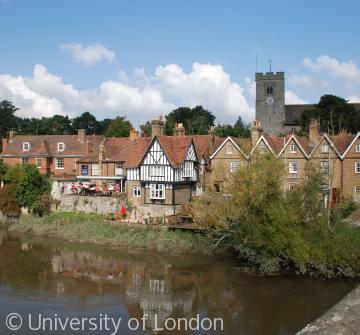Villages
 The village of Aylesford in the Medway Valley, Kent
The village of Aylesford in the Medway Valley, KentThe complexity in distinguishing between parishes, both ecclesiastical and civil, vills and townships, means that the term village may be an easier one to deal with as a description of a settlement which included houses and communities of people.
However, the term is sometimes used in a more specialist fashion. Estate villages are 18th and 19th century creations by landowners who rebuilt, sometimes involving moving, villages where they owned all the property in vernacular styles. Good examples are Milton Abbas, Dorset, and Edensor on the Dukes of Devonshire’s Chatsworth estate in Derbyshire, where a variety of pattern book designs ensured that every house had an individual character. Open and close or closed villages were terms invented in the 19th century by the Poor Law Commissioners to denote villages where the land was owned either by a single person or a small group (close), or where the land was fragmented between a number of different owners. Close villages were characterised by neat appearances, public houses (when allowed) named after the squire, and conventionally Church of England, while open villages were more populous, had greater numbers of the poor, nonconformist chapels, and a greater element of social laxity.






